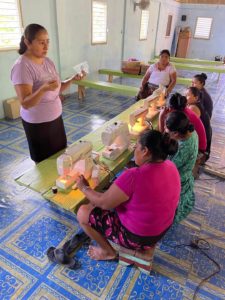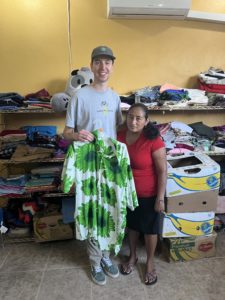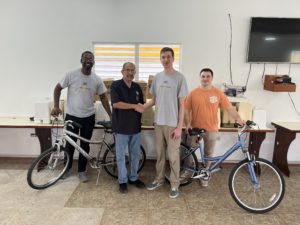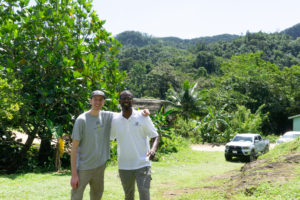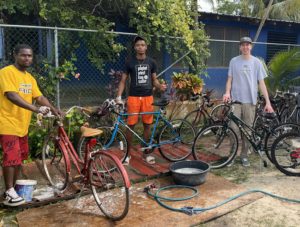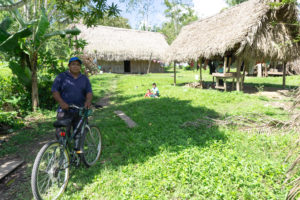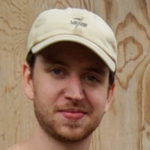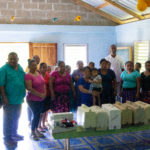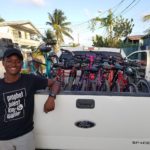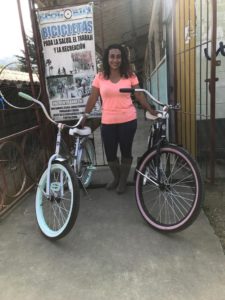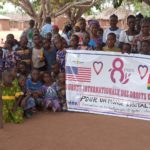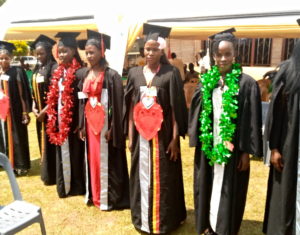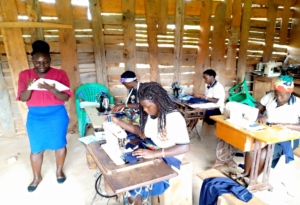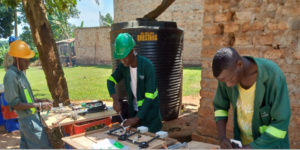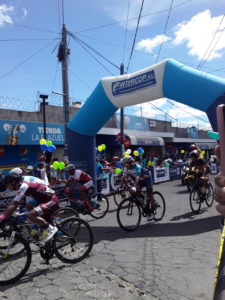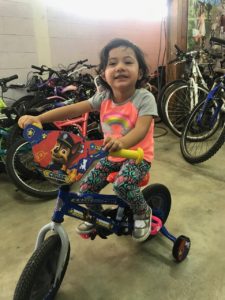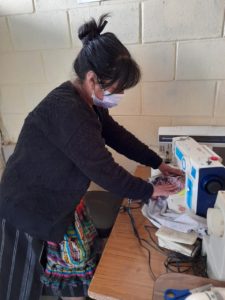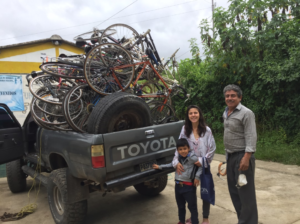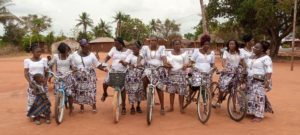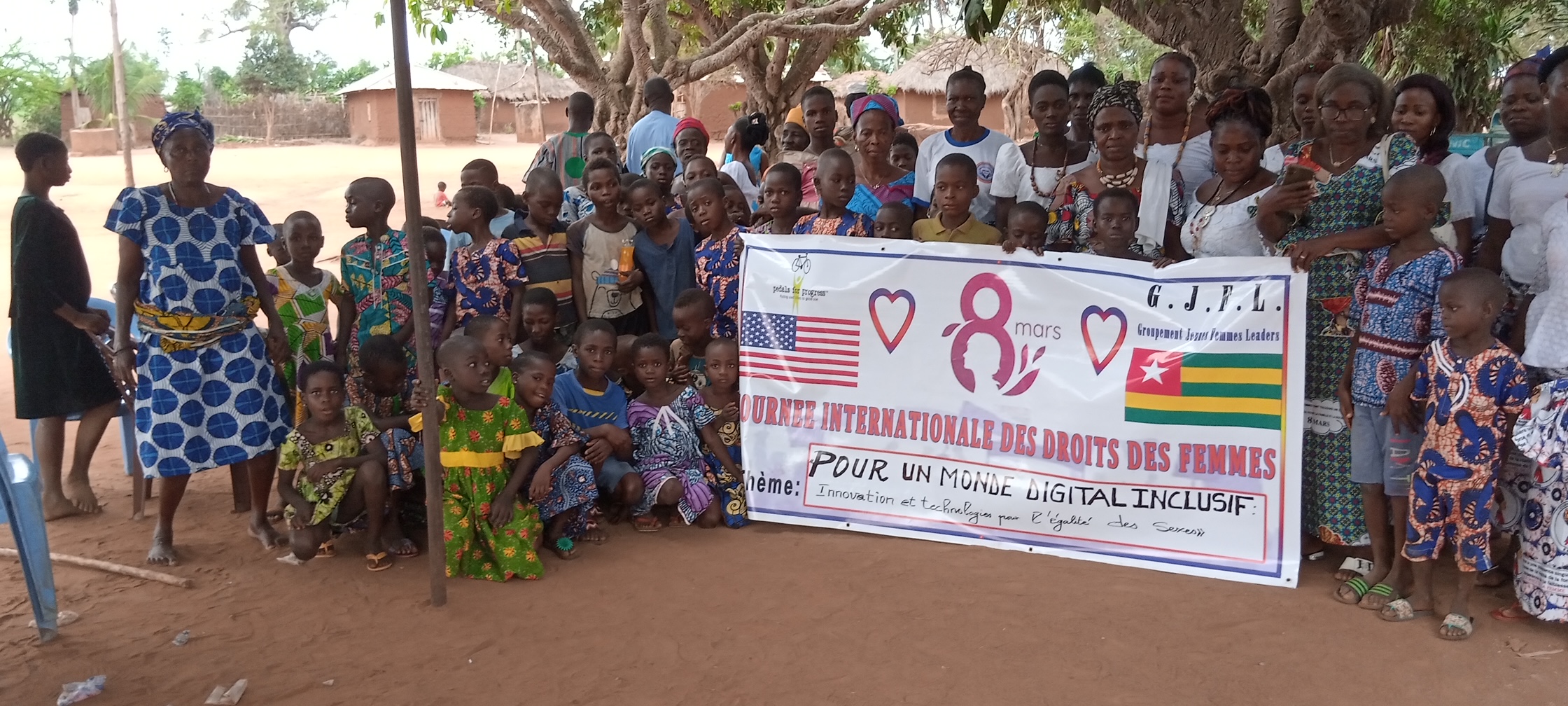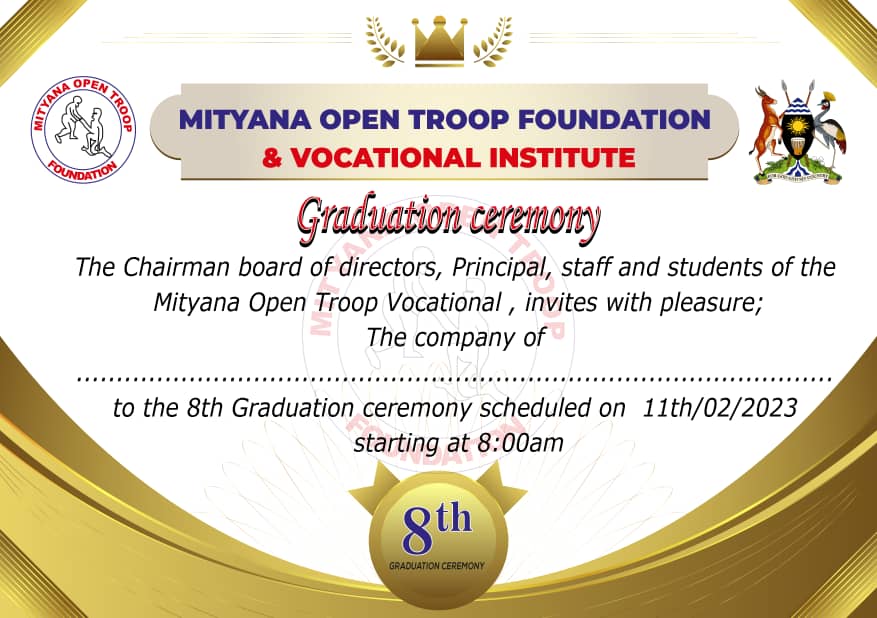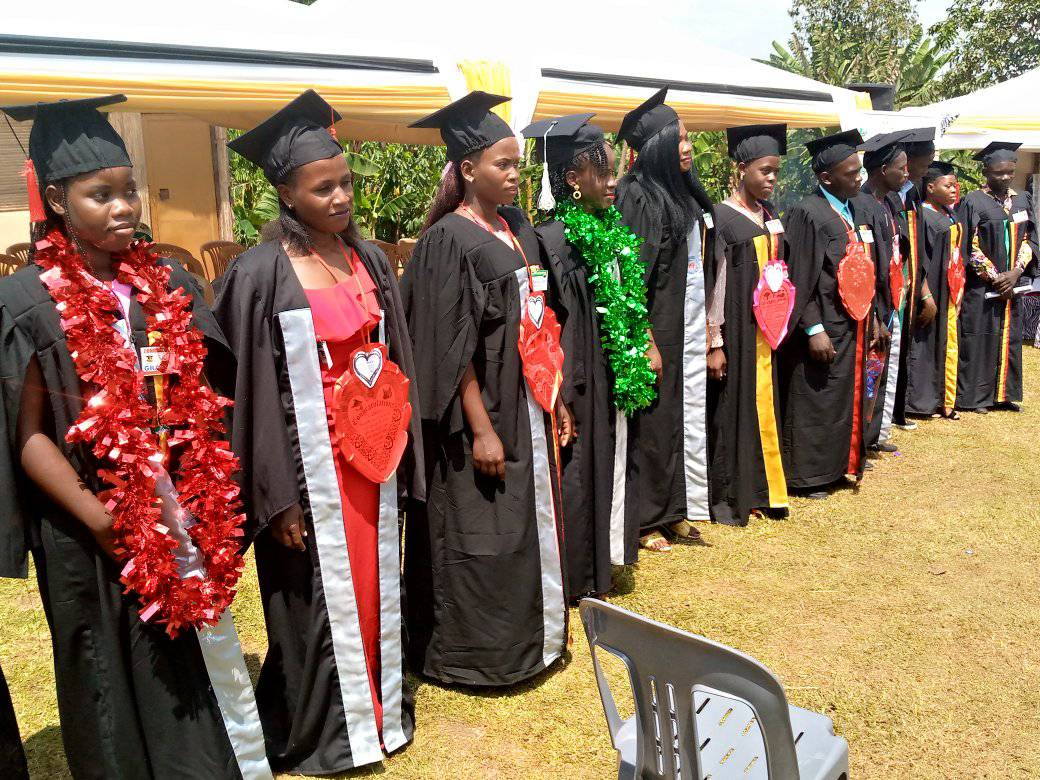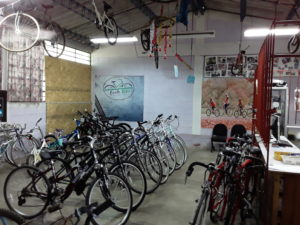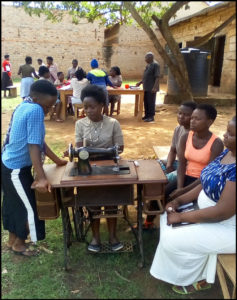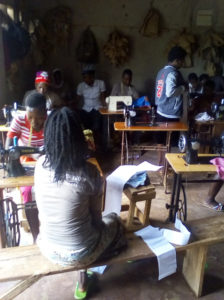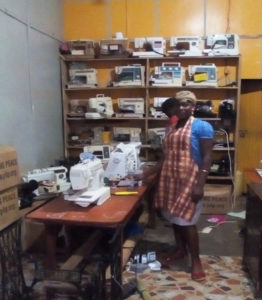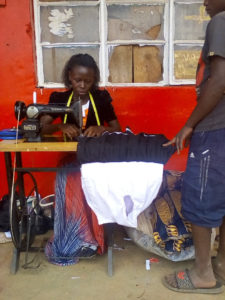Pedals for Progress, a New Jersey nonprofit corporation, empowers sustainable economic development by recycling bicycles and sewing machines from the U.S. and shipping them to motivated people in the developing world. Pedals for Progress (P4P) is a nonprofit charity incorporated under the laws of New Jersey, and registered with the Internal Revenue Service as a tax-exempt charity under section 501(c)(3) of the federal tax code (EIN: 22-3122003). An eleven-member unpaid board of trustees oversees a paid staff of 4 and a network of hundreds of volunteers.
2022 Highlights
Pedals for Progress shipped 5 containers and 3 LCL (Less than Container Load) shipments for a total of 2,322 bicycles, and 514 sewing machines, to 7 nonprofit agency partners in 7 developing countries. This brings cumulative donations shipped since 1991 to 166,006 bicycles, 6,043 sewing machines.
We concentrated our collection operations in New Jersey and in the New York City and Philadelphia suburbs increasing our efficiency. Our bicycle and sewing machine collections were sponsored by 26 community partners in four states.
New Leadership
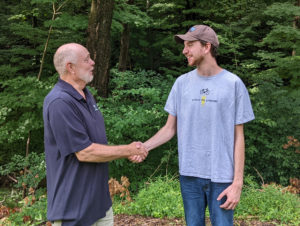 P4p has a new president. At their 14 August 2022 meeting, the P4P Board of Trustees approved the transition plan that’s been in the works since 2021. David Schweidenback, founder and President from 1991 until now, is now Vice President, International Programs. Alan Schultz is our new President.
P4p has a new president. At their 14 August 2022 meeting, the P4P Board of Trustees approved the transition plan that’s been in the works since 2021. David Schweidenback, founder and President from 1991 until now, is now Vice President, International Programs. Alan Schultz is our new President.
2022 Shipments
Recipients of Fiscal 2022 Bicycle Container Shipments
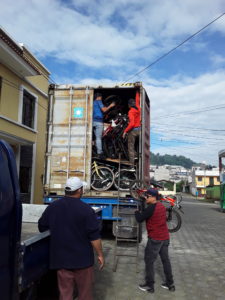 Association Défi et Révolution de la Vie Rural (DRVR), Togo (927 bicycles and 123 sewing machines in two shipments)
Association Défi et Révolution de la Vie Rural (DRVR), Togo (927 bicycles and 123 sewing machines in two shipments)- Fundación Integral de Desarrollo Sostenible y Medio Oriente (FIDESMA), San Andres Ixtapa, Guatemala (470 bikes and 15 sewing machines)
- P4P/Belize, Belize (473 bicycles and 100 sewing machines)
- Rwanda Wildlife Conservation Association (452 bicycles and 60 sewing machines)
Started the year 10/1/21 with 315 bicycles in inventory.
Ended the year 9/30/22 with 646 bicycles remaining in inventory.
2022 Total Shipped 2,322, Total Collected 2,503
Bicycle Shipments by Region
|
Fiscal 2022 |
Fiscal 2021 |
| Africa |
60% |
68% |
| Asia |
0% |
0% |
| Central America |
40% |
15% |
| Eastern Europe |
0% |
17% |
Recipients of Fiscal 2022 Sewing Machine LCL Shipments
- Rising Hope Foundation for Change, Cameroon (72 sewing machines)
- Mityana Open Troop Foundation, Uganda (72 sewing machines)
- Hiran Youth Council, Somalia (72 sewing machines)
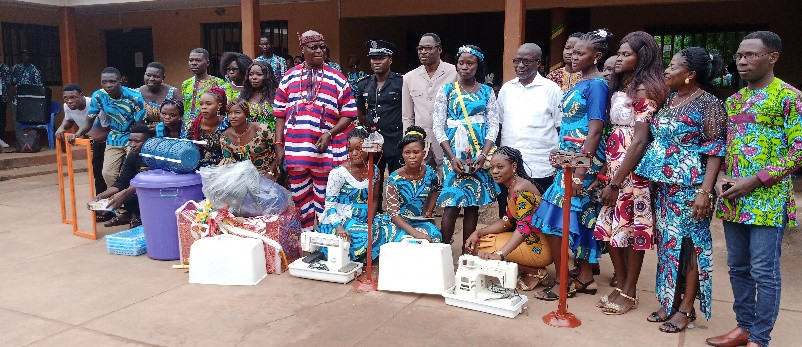 Started the year 10/1/21 with 73 sewing machines in inventory.
Started the year 10/1/21 with 73 sewing machines in inventory.
Ended the year 9/30/22 with 220 sewing machines in inventory.
2022 Total Shipped 514, Total Collected 617
Sewing Machines Shipments by Region
|
Fiscal 2022 |
Fiscal 2021 |
| Africa |
78% |
81% |
| Asia |
0% |
0% |
| Central America |
22% |
7% |
| Eastern Europe |
0% |
12% |
Overseas Partners
During the year, Pedals for Progress focused on a small number of reliable partners for the majority of our shipments.
The most critical factors in creating a sustainable, self-financing partnership are shipping costs and effective administration by our overseas partners. Experience has proven that when the shipping costs are at or below $15 per bike or $10 per sewing machine, with good management, this cost is low enough to sustain a self-financing partnership. Without charitable donations, grants or other funding, Pedals for Progress is limited to working primarily in Central America and the Caribbean, while Africa and Eastern Europe require subsidies to pay their higher shipping costs. Overseas distribution success is determined by per unit cost. Landlocked countries remain beyond our reach due to excessive inland transportation costs. Domestic shipping is also expensive; our domestic inland trucking costs to get shipments to port have more than doubled in the last five years.
While our primary goal is to supply environmentally sound transportation to communities and stimulate the greater movement of goods and services, our partners often generate extra funds from the bikes we ship them. These windfall funds, in turn, finance a breadth of community development activities.
Still, we are hopeful that other partner organizations, including some that did not receive bikes in 2022, will pay all or most expenses for new shipments in fiscal 2023, or subsidies will be found to initiate new programs.
Continuing Partners
- Cameroon: Rising Hope for Change, Limbe
- Guatemala: Fundación Integral de Desarrollo Sostenible y Medio Oriente (FIDESMA), San Andrés Itzapa, Chimaltenango
- Rwanda: Rwanda Wildlife Conservation Association, Kigali
- Tanzania: The Norbert and Friends Foundation, Arusha
- Togo: Association Défi et Révolution de la Vie Rurale (DRVR), Vogan
- Uganda: The Mityana Open Troop Foundation, Mityana
- Belize: P4P/Belize, Belize City
- Somalia: Hiran Youth Council, Mogadishu
New Partners 2022
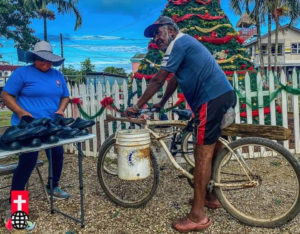
P4P/Belize, Belize City, Belize. We shipped a container of 473 bicycles and 100 sewing machines.
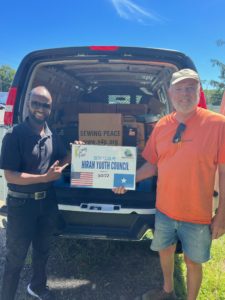
Hiran Youth Council, Mogadishu, Somalia. We shipped 72 sewing machines.
Finances
2022 was a turbulent but good year for Pedals for Progress finances. We started fiscal 2022 in a strong financial position with a strong balance sheet. Our operating income relies on four primary income streams: cash donations with bikes and sewing machines, cash donations from the twice-annual solicitation, corporate donations, and revolving funds and fees from our international partners. Solicitations were not as positive as years prior, but larger donations from a few long-term supporters helped us meet our solicitation goals. Direct corporate donations have been decreasing over the past twenty years due to a focus on employee matching programs. As a category, corporate donations also exceeded budget expectations largely due to David’s efforts with a historic donor. Our sustaining international partners are expected to reimburse Pedals for Progress for the cost of containers or LCL shipments. These are categorized as “revolving funds”: the partners save income to pay for successive shipments. This category met expectations as the number of containers shipped to sustaining partners met the plan. Overall, 2022 operating income exceeded budget.
Operating expenses include four large categories: employee and officers compensation, shipping and packing, collections expenses, and office rent. In 2022, employee and officer’s compensation exceeded budget largely due to the addition of the Vice President of Operation. Shipping and packing expenses were higher than expected largely due to the increased cost of shipping and fuel. Collection expenses, office rent, and all remaining minor expenses categories met expectations.
P4P in 2022 had a few extraordinary items. P4P has a conservative investment policy. 2022 was a good period for stocks, bonds, and mutual funds as they generally increased in value. These generated other income for P4P as did some of the stock donations.
Overall, 2022 exceeded financial expectations for P4P.
Balance sheet and profit and loss statements are attached.
Corporate Donors
 FedEx continues to deliver to New Jersey, at no cost, the bicycles collected by the Green Mountain Returned Peace Corps Volunteers, based in Burlington, Vermont.
FedEx continues to deliver to New Jersey, at no cost, the bicycles collected by the Green Mountain Returned Peace Corps Volunteers, based in Burlington, Vermont.

General Pallet, at no cost, supplies the specialized pallets required for international shipping of SP sewing machines.
Thank you to the many corporations that participate through matching gifts.
We are very thankful for the support of these organizations and the recognition they have given us.
Key Volunteers
Pedals for Progress depends on the efforts of volunteers, several hundred of them, to publicize and work collections, prep bikes for shipping, help us warehouse bikes, and eventually load them into containers bound for our partner agencies overseas.
We would like to thank Daryl Detrick with the Warren Hills Regional HS Computer Science Club for all of their volunteer hours helping to pack outgoing shipments. A special thanks to Michael Sabrio for managing at bike collections and taking over the Webmaster duties. We thank our Tinkerers Dennis Smyth and Mary O’Brien for their excellent work refurbishing many of the sewing machines we shipped.
We especially thank these collectors:
- Jerry Agasar with the Newtown, PA, Rotary Club: 159 bikes and 21 sewing machines
- Casey Walsh with Faith Lutheran Church: 116 bikes and 5 sewing machines
- Joanne Heidkamp with the Green Mountain RPCVs: 249 bikes and 155 sewing machines
- Christine Potts with St. John’s Episcopal Church: 165 bikes and 24 sewing machines
- Daryl Detrick with the Warren Hills HS Computer Science Club: 153 bikes and 53 sewing machines
2022 Collection Sponsors
Bernardsville United Methodist Church
Blooming Glen Mennonite Church
Chester County Solid Waste Authority
Clinton Presbyterian Church
Emmanuel Bible Church
Episcopal Church of St. James
Faith Lutheran Church
Green Mountain Returned Peace Corps Volunteers
Long Island Returned Peace Corps Volunteers with Youth of Ethical Societies
New Dover United Methodist Church
Passaic County Office of Solid Waste & Recycling
Patriots’ Path Council – Raritan Valley District with Troop 14
Rotary Club of Branchburg
Rotary Club of Fair Lawn
Rotary Club of Flemington
Rotary Club of Newtown, Pennsylvania
Rotary Club of Norristown, Pennsylvania
Rotary Club of The Palisades
Rotary Club of Westfield
Saint Andrew’s Presbyterian Church
St. John’s Episcopal Church
Warren Hills Regional High School Computer Science Club
Washington Alliance Church
Will and Tyler Sussis
Woman’s Club of Paramus
Program Challenges
Pedals for Progress faced several challenges in our fiscal 2022 year but ended the year on a strong and positive note. Most of these challenges stem from rippling effects of the COVID-19 Pandemic, inflation, and increased prices of gasoline and shipping.
Internally, the organization had to take on a larger budget than usual to ensure an effective transition to our new leadership. As we planned in 2021, Alan Schultz was elected President in August 2022 and founder David Schweidenback became Vice President of International Programs. The internal transition proved to be effective, but the added salary was burdensome.
The bicycles collected this year continue to be the highest quality bikes that we have ever collected. The most common brand name was Trek and we collected over 80% mountain bikes in the adult bike category. The vast majority of bikes we collected were originally sold in a bike shop for a relatively high price. P4P collected almost no lesser quality mass merchandise bikes that are sold at big box stores like Walmart.
Though the quality of bikes was higher than ever, our volume was significantly down due to the pandemic. The fall collection season was successful and helped us ship the majority of our five containers for the 2022 fiscal year. However, spring collections were down significantly as the average number of bikes was lower than years prior. As we are reliant on the success of collections to keep us financially active, we had to rely heavily on our summer solicitation to help us keep up with our added salary line and general operations.
The summer solicitation was not as successful as we would like but by the end of August, we were able to rebound thanks to several large donations from some long-time supporters. These donations allowed us to finish off the year on a positive note and remain cash positive.
Pedals for Progress developed partnerships worldwide to diversify relationships and reduce the risk of events in one country or region negatively affecting our operations. Since reduction of transportation costs is doubtful, we are seeking sponsorships to supplement our African and other high cost partnerships. Partner programs in Central America, which have a landed cost of under $15 per bike, are successful financially and require no further subsidies to continue shipments. P4P inland partners in Eastern Europe and Africa will fail without financial support. International shipping costs in these regions run from $16 per bike on the coast to as high as $38 inland (Uganda).
Shipping the sewing machines within bicycles shipments makes the delivery of these heavy objects affordable. However, our bicycle partners need relatively few sewing machines. The challenge is to find the funding to deliver machines to small sewing programs like the Mityana Open Troop Foundation in Uganda or to get them delivered very inexpensively. Most new sewing projects require only two pallets of machines; we pack 36 machines on a pallet. Due to that low volume, we previously shipped via air freight, which is very expensive. P4P developed in 2013 the capacity to ship by boat individual pallets of sewing machines at a very reasonable cost. This low-cost shipping allows us to expand our small standalone sewing machine projects globally.
Goals for 2023
During fiscal 2023, Pedals for Progress plans to ship approximately 3,600 bicycles and 600 sewing machines. Collection sites where we send our personnel will be limited to New Jersey and the greater suburbs of New York and Philadelphia. Bicycles collected outside this region need to be delivered to our New Jersey warehouse by the collection sponsors.
Pedals for Progress challenges are financial, not supply-side driven. With more funding, we can collect significantly more bikes within our current footprint and initiate more programs internationally. Increasing production requires more staff for attending potential collections and more vehicles on the road. The operational costs of producing the bicycles and sewing machines are significant. P4P is unable to accept bicycles without an accompanying cash donation; this limits production. Most large charities do not like to give money for operational expenses, but in our case, it is the collection efforts that produce the product we deliver. In many ways, you can think of P4P as a trucking company. Every trip in the truck produces more bicycles and sewing machines, our products. These products make the difference globally by helping people in need help themselves.
2022 Board of Trustees
Jamie Acosta
Jerry Agasar
John Alexander, Secretary and Assistant Treasurer
Daryl Detrick
Ann Fitzgerald
Sarah Jannsch
Richard Millhiser, Chair
David Schweidenback, Treasurer and VP, International Programs
Casey Walsh
Andrew Williams
Bob Zeh
Staff
Alan Schultz, President
David Schweidenback, VP, International Programs and Founder
Michael Sabrio, Webmaster
Gary Michel, VP, In-kind donations
Robert Delghiaccio, Warehouseman
Lori Smith, Office Manager
Further information about Pedals for Progress is available at www.p4p.org. This includes our financial statements, IRS Form 990s, and information about our 501(c)(3) nonprofit tax-exempt status.
To receive our newsletters or information on how to collect bikes and/or sewing machines, contact alan@p4p.org. To request a donation of a container of bicycles or sewing machines, contact Dave at dschweidenback@gmail.com.
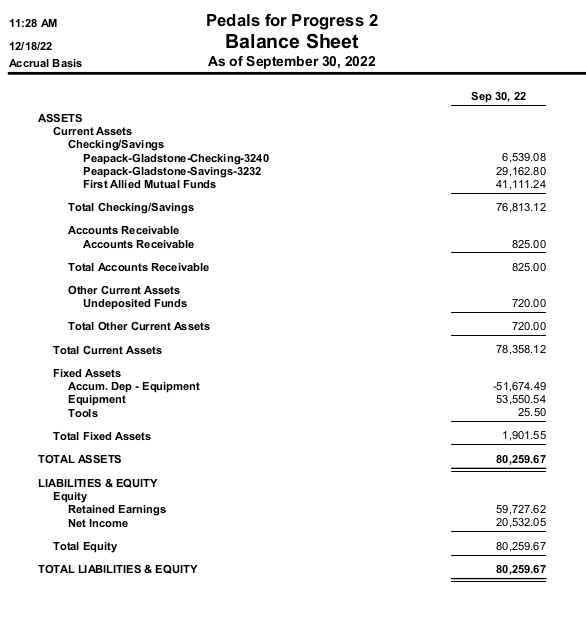
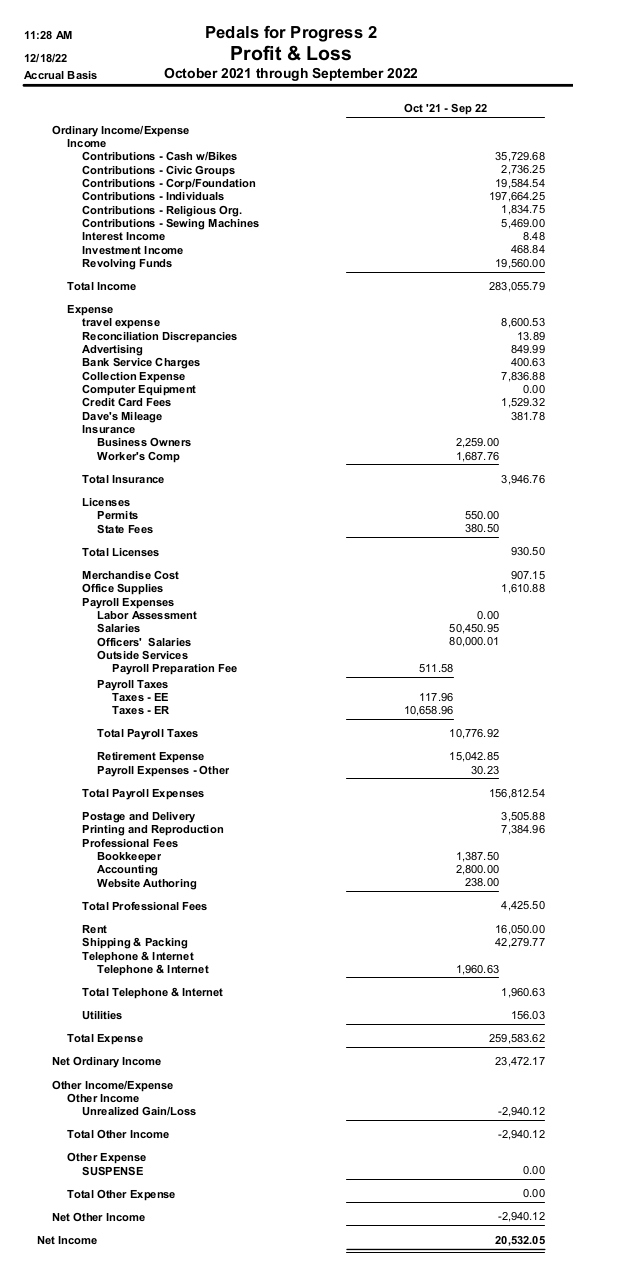
 By Alan Schultz
By Alan Schultz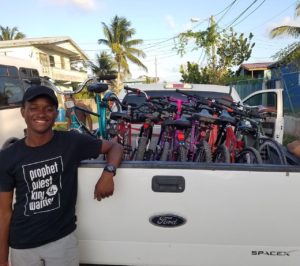 Employment
Employment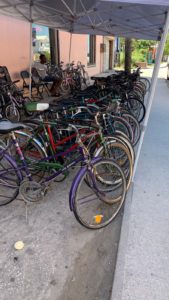 The sales process involves a range of strategies, from larger street market sales to smaller individual transactions arranged through word of mouth or online advertisements. The sales reps earn a commission on the sale of the bikes, with a recommended starting price set by Derrick. This gives the salesmen incentive to maximize their efforts and help Derrick distribute the hundreds of bikes that we send him.
The sales process involves a range of strategies, from larger street market sales to smaller individual transactions arranged through word of mouth or online advertisements. The sales reps earn a commission on the sale of the bikes, with a recommended starting price set by Derrick. This gives the salesmen incentive to maximize their efforts and help Derrick distribute the hundreds of bikes that we send him.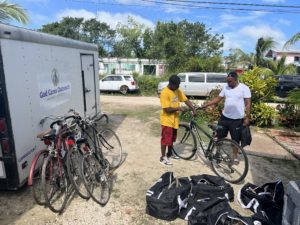

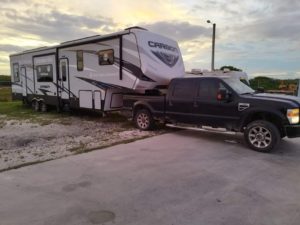 Prior to partnering with P4P, Derrick acquired buses and an RV from the United States through another charitable organization he has partnered with. Driving them down to Belize himself, Derrick was able to get the vehicles into Belize. From there, he has used them for several projects.
Prior to partnering with P4P, Derrick acquired buses and an RV from the United States through another charitable organization he has partnered with. Driving them down to Belize himself, Derrick was able to get the vehicles into Belize. From there, he has used them for several projects.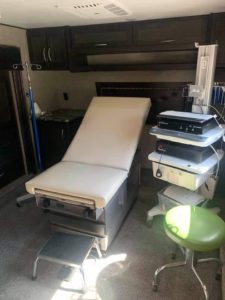 Derrick uses them to transport and distribute medical supplies to community members in need. With the size and mobility of the buses and RV, Derrick ensures that essential healthcare resources reach those who require them most. This initiative plays a crucial role in improving access to medical assistance and addressing healthcare disparities in the region.
Derrick uses them to transport and distribute medical supplies to community members in need. With the size and mobility of the buses and RV, Derrick ensures that essential healthcare resources reach those who require them most. This initiative plays a crucial role in improving access to medical assistance and addressing healthcare disparities in the region.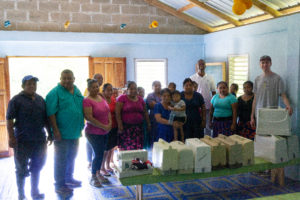 During my visit I was able to be present during the day we donated 20 sewing machines to the villagers and a bicycle to the chief. Kicking off this program we met with the women and expressed out gratitude and detailed what we hope to achieve.
During my visit I was able to be present during the day we donated 20 sewing machines to the villagers and a bicycle to the chief. Kicking off this program we met with the women and expressed out gratitude and detailed what we hope to achieve.